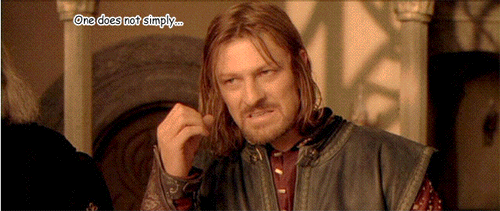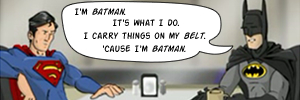The Potential Of Affectionate Parody
Evidently the visionary-author blogosphere has been echoing with a controversy: is it okay for Christians — especially attempting authors — to write negative reviews of other books?
And last Friday brought a related discussion: is it okay for Christians to spoof their own?
This isn’t something I thought about before, to be honest, during or after my interview with Ted Kluck, who’s part of a committee writing a POD parody called Beauty and the Mark of the Beast, spoofing Christian end-times fiction. Until now I hadn’t considered that a parody could seem intrinsically nasty — which I suppose it could, and which I must consider.
Why? I would suggest two reasons.
First: people often parody things they actually enjoy — though one might call this affectionate parody that mostly spoofs fans’ reactions to a story or franchise, or serves as a takeoff for goofiness that’s actually unrelated. Example:

This is different from a more-hostile Lord of the Rings parody — and I wish I could illustrate what such a mean-spirited parody would look like, but I don’t have it in me and frankly can’t think of anything to spoof in the books. (The films, though, present their best opportunity in the last film when Legolas so astutely remarks that Aragorn’s plan is to create “a diversion.”)
And many ways exist to make fun of a story, not all of them hostile, such as:
- Affectionate parody, which can include making fun of an actual story though with love for the story itself. As my wife said this morning, so many spoofs and funny fanfiction works on Lord of the Rings websites were likely written by those who cried during Boromir’s death and can name nearly all of Elrond’s antecedents.
-
Takeoff, perhaps best illustrated by the animation above. Its maker wasn’t mocking Boromir, or Middle-earth pronunciations, or anything, but only being goofy.
- Satire, such as C.S. Lewis’s The Screwtape Letters — no specific person/thing is being mocked, but the comparison of Hell’s hierarchy with a business bureaucracy is classic. It also helps us laugh at ourselves (more on this in a bit).
But then there’s:
- Hostile parody, which resembles affectionate parody but is clearly meant to disparage the target. We’ve all seen the slamming of Twilight or other things for being poorly written or shallow, or political cartoons showing presidents with exaggerated ears or rhetoric.
Is this acceptable for a Christian? This is something I’m still sorting out, especially as a still-recovering political columnist. Scripture has precedent for making fun of bad guys — Jesus’ slams of the Pharisees, for sure, being the best-known example. But that was Jesus. He knew the Pharisees He was slamming would not repent and believe in Him. We’re never told to imitate Him in that regard — instead, we’re told to love our enemies — and certainly not adopt that practice as the method of dealing with those who despise or persecute Christians.
Thus, hostile parody would seem off-limits for the Christian. But as I noted above, the two categories can seem to overlap, making a parody’s intent difficult to discern.
 Does the Beauty and the Mark of the Beast fall into affectionate parody? From what I’ve seen on the work-in-progress’s website, I think it does. Most of what’s there seems to poke gentle fun at the responses of some end-times thriller fans, and the worst kind of the-end-is-near reactionaries. Actually a lot of what is there doesn’t spoof Left Behind as much as pop evangelicalism, obsessions with Christians sports celebrities, even legalism. Example:
Does the Beauty and the Mark of the Beast fall into affectionate parody? From what I’ve seen on the work-in-progress’s website, I think it does. Most of what’s there seems to poke gentle fun at the responses of some end-times thriller fans, and the worst kind of the-end-is-near reactionaries. Actually a lot of what is there doesn’t spoof Left Behind as much as pop evangelicalism, obsessions with Christians sports celebrities, even legalism. Example:
Parker, Strongbow hypothesizes, is his most worldly teammate, and therefore least likely of his acquaintances to be raptured. He never kneels in the endzone after scoring touchdowns, has lots of tattoos, and listens to rap music. He has never once thanked God in a postgame interview, a track record that Strongbow privately feels is semi-unacceptable.
Strongbow was also the only player on the Denver Broncos to refuse implementation of the state-of-the-art NFL.com™ Fan/Player Homing Device™ – a chip which is implanted just below the skin at the nape of a player’s neck, and allows subscribing fans to track measurables like a player’s resting heart rate, exercise habits, diet, sexual activity, and frequency of urination. It is billed by the website as “The Next Level in Player/Fan Interaction!” Strongbow feared that the implementation of the chip had serious End Times implications.
What’s being spoofed here? I hate to give away the jokes, but here it is: thinking that sports stars aren’t “Christian” enough if they don’t preach in every interview, demigod-level sports star status in general, and suspecting things like computer chips as forecasting dooooom.
These are things that real Christians, seriously, have gotten into — and which we might need to remember to laugh at ourselves about. Oh yeah, I have done that before, haven’t I?
It’ll help add humility, just as a well-written, gracious, negative review could help an author.
Moreover, knowing of potential parody red-zones could help an author find and eliminate them in advance, along with grammar and character development errors, eh wot?

"Doctor Who and the Curse of Fatal Death" (1999): a lampoon of classic "Who." Guess what its writer, Steven Moffat, is doing now? Running, and still loving, the actual "Doctor Who" series.
Earlier I mentioned two reasons for enjoying affectionate parody. The second is this: I’ve written parody myself. Even Left Behind parody. I loved Left Behind years ago — and to some extent still do, though I’ve re-thought some end-times views — but still had to spoof it. However, like other fanfiction for a beloved franchise, mine was more a spoof of what would happen if Disney (despised more back then, thanks to the boycotts) got ahold of Left Behind.
Observe:
(SCENE 20: The evil and mean-spirited secretary general for the U.N.—now called the ET—Nicolae Carpathia, and his cute but sinister wisecracking demon sidekick/henchman, Leonardo “Slimer” Fortunato, are both in their office at a top-secret military base in the ET [Earth Takeover] building.)
NICOLAE CARPATHIA: Moo-hoo-ha-ha-ah-ah-ee-ee-eeee!
LEONARDO “SLIMER” FORTUNATO: Ya-ha-ha-ah-ah-ee-ee-eeee!
NICOLAE: Well, Slimer, we done heard lotsa news about them American folks storin’ up them weapons ta shoot at me, but we got ‘em first! We done gots rid of that stinkin’ White House thingy and kilt that sissy patriotic president o’ theirs, Bill Clinton.
SLIMER: And Viccce Presssident Al Gore too, Missster Carpathia. We will not have to worry about them ever again.
[Note: actually the rest of the scene shows that they magically escaped and joined the good guys.]
NICOLAE: Yah, an’ that finally makes my takeover o’ the U.S. complete! But now we gots to blow up s’more stuff in other places so everybody knows that I gots more special effects than they do.
SLIMER: Now we will presss the buttonsss that will activate our sssecret arsssenal of computer-generated exxxplosssionsss, flying bodiesss and their ressspective partsss, and, of courssse, lotsss of fireballsss and noissse. (reaches for control panel)
NICOLAE: Yah, le’s do it! I’ll blow up the Great Wall of China and the Taj Mahal, and you take Buckingham Palace and the Statue of Liberty.
SLIMER: Okay, and I will alssso blow up the Sssearsss Tower.
NICOLAE: Nuh-uh! I wanna blow up the Sears Tower!
SLIMER: No, me!
NICOLAE: Me!
SLIMER: Me!
NICOLAE: But I get to hit them there Great Pyramid things!
SLIMER: No! Thossse are mine!
(Both of them jump onto the control panel and begin pushing buttons at random.)
So far I believe this is still something I would not mind the Left Behind series authors seeing. It’s affectionate, not hostile, and helps us humbly see flaws while having fun.
The same held true when in 1999, on the Left Behind series online bulletin board, I wrote a “proof” that the end of the world was coming on April 1, 2000. Hundreds posted in response, among them dozens who clamored to cry out: You can’t predict the date of Jesus’ return!
But one of the good guys, in response, recalled how while he was editing a magazine some years ago, the publication ran a bit of satirical fiction: about a woman who couldn’t get her non-Christian husband to come to church, no matter how much she nagged and cajoled him. People wrote to the magazine and insisted That’s not how you do it at all!
“Lots of people don’t get it,” he observed about both spoofs.
That man was Jerry Jenkins. And he and the Left Behind series are largely responsible for my love of visionary fiction today — and for Speculative Faith version 2.0 being here.
Given all that, what do you think about affectionate/hostile parody, takeoff and satire? Have I missed something? Is it okay to spoof something we enjoy? What if we actually did get to know the person whose work you once spoofed or critiqued? Has this ever happened to you?











































There is definitely such a thing as affectionate parody. I know, because I do it to my own books sometimes. 😀
Heehee…what is it about the Council of Elrond that allows for so many great spoof gifs? That one always makes me laugh.
Couple things, Stephen. First, Jesus never made fun of the Pharisees. He was rebuking them, correcting them, not making sport of them. He wasn’t deriving pleasure from calling them names or gathering a crowd to point and laugh. They didn’t think it was funny, and clearly Jesus didn’t think it was funny. It was deadly serious that they were being hypocrites. God doesn’t take sin lightly!
That being said, I question whether it is right to parody something sinful (homosexual activity, abortion, prostitution) or a non-Christian acting like a non-Christian. If a Christian sins against us, we have Scriptural guidelines how to handle such, so I guess I’m saying I don’t think it’s right to parody a Christian who is sinning either.
That leaves non-sinful stuff and people who might be acting foolishly (political cartoons would work here). If the non-sinful is actually Christian, then we need to be careful we aren’t engaging in blasphemy. If the people are acting foolish, then we need to ask if we are loving them by making fun of them.
This reminds me a little of teasing. Some people tease, but mean it and use it to get a point across. Consequently, it’s hurtful. (Political commentary may fall in a different category, but only because our culture has put it there).
Some people don’t mean it at all and only tease about things they don’t believe to be true (my what beautiful green hair you hav or happy birthday — are you ten now?)
I opt for the latter use, but even that can get old and become hurtful (I know, because I’m the one who overused it and hurt relationships as a result).
In writing, I think we need to be even more careful simply because there is no twinkle in the eye or inflection in the tone to tip off a reader that the writer is just kidding.
I’ll be honest, there were parts of Ted’s interview that I had no idea whether he was serious or not. Why? Because of his light-hearted tone and early jokes. Here’s someone I don’t know, so how am I supposed to read him? He starts seriously, swings into jocularity, so from that point on, I wasn’t sure what to take seriously and what was to be considered part of the joke.
I guess I’d say, we Christians should have a higher standard, and to be honest, parody isn’t all that far up the humor ladder than slapstick. Can’t we do better?
Becky
I just thought of something else. Part of the problem of parody is a smug, “I’m better than this” attitude. Think SNL parody of Sarah Palin. It smacks of the cool kids in school making fun of the ones too poor to wear the latest or own the newest. I think the prideful tone of much parody is what is so off-putting to me.
Becky
This is a slight tangent but I think it is germane: Orson Scott Card recently wrote something so profound and yet so basic that I feel it is worth reposting here. In his review of the Gore Verbinksi / Johnny Depp animated film Rango, Card took script writer John Logan to task for not being funny. Card knows things I’m still learning. To whit:
Rango bears all the earmarks of utter carelessness. Not in the animation — that’s excellent. It’s the writing that is contemptible. Why did anyone read this script and imagine for a moment that they had a movie? The little children in the theater around me were sleeping, talking, running around — but not watching. They knew there was nothing remotely interesting on the screen.
Then I looked back through the writer’s filmography and realized: He has never written anything with a scrap of humor in it. He truly had no clue of the rule that all good comedy writers know: Comedy only works when we empathize with characters who are suffering.
I imagine this is an element of parody, as well. The difference is with the SNL folks, they’re the ones making the character suffer for their amusement. So while there is humor there, it is mean-spirited and cruel, and really works best when you become complicit with their torture. That’s disturbing.
Are there some things that are off limits? Are some things just mean spirited and crass in an effort to get an easy laugh? I often hid my insecurities with sarcasm and hurting others in an effort to make myself look better and I often see the same undertones in much of the parodies that are out there.
As Christians should we parody someone’s serious work even if we disagree theologically with it? When we do so are we trying elevate our own position at the expense of someone else’s?
If we cannot do it in love and respect, if it does not have the mind of Christ, does it belong in the body of believers? As one who grew up with SNL as a mainstay of my existence I know the draw of mean spirited humor, and it can be powerful.
I’m surprised no one in this conversation so far has mentioned one of Marcher Lord Press’s first releases, Hero, Second Class (especially since the sequel is set to release next month). That book was specifically written and billed as a parody of the fantasy genre. Just reading the synopsis gives you that clue:
While the book itself had a few pacing/plotting issues, I thought it was hysterical from the very first page. It took the genre and shook it for all it was worth, lovingly mocking all the stuff we love, teasing at the cliches and the overused plot devices, ultimately making points about the very nature of what it means to be a supernatural hero. Mostly, it was a rollicking fun story to read.
It strikes me that often parody and its more mature sister satire are best delivered by members of the group being mocked. When you’re in a group, you know more of its foibles and how to show them in a humorous way. When Mark Lowry talks about Baptists and religious people, I laugh because I know he’s not saying it out of spite, he’s speaking in love about the very real problems we have in our churches. Oscar Wilde is hilarious in his upraiding of the Brittish middle and upper class, but I don’t think his works would have gone over as well with an American saying the same thing (he had a tough enough time as an Irishman).
Off the top of my head, I can think of one time a prophet of God used parody: when Elijah challenged the prophets of Baal at Mount Carmel. As the idol’s prophets grew more desperate in their pleas, 1 Kings 18:27 says
Now, Elijah wasn’t a perfect man; shortly after this story he suffered a debilitating depression and crisis of faith. We aren’t called to be like him, but like Christ. Still, God answered his prayers on Mount Carmel and used him to bring the nation of Isreal back to Him that day. Was his taunting part of that strategy, which God honored? I don’t know, but I think it does me we have to consider the question. If metaphor, allegory, and symbolism are allowed authorial techniques, ought not humor, parody, and satire to be considered as well?
I was reading this post in the library–and had to scroll down to make myself stop laughing at the Boromir/LotR clip. That was great. I think that parody works best when it’s done from the inside–I’m not a romance fan, so any attempt of parodying romances on my part would come off as an insult. But if it’s something I like–fantasy, sci-fi–I’m perfectly fine with trying. I even wrote a few parodies of what LotR would look like in the modern world–complete with “Departments of Sword Control” and beauty pagents.